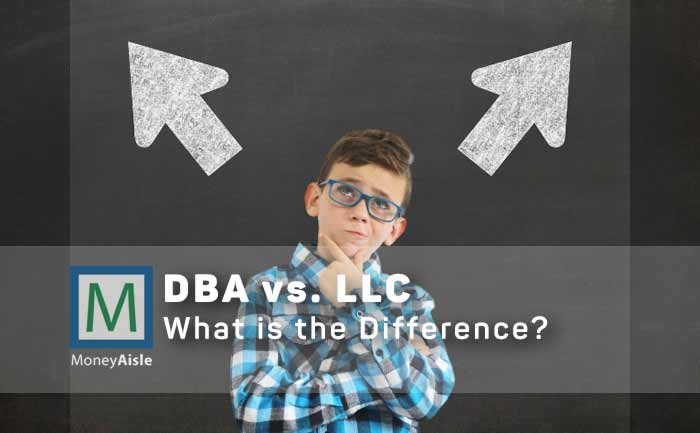DBA vs. LLC: If you’re starting your business, you need to decide whether you will operate as a DBA or LLC. There are a lot of differences between the two entities that you need to consider before making your decision.
Here we’re covering how to make your choice as well as the benefits and downsides of both.

While starting a new company, expanding an existing business, or pitching a freelance gig, business owners face difficulty in deciding between a “doing business as” (DBA) or “limited liability company” (LLC).
The main difference between a DBA and LLC is that an LLC is a business structure that provides liability protection, whereas a DBA is just a registered alternate name of your same company.
There are pros and cons to each option. Therefore, it is important that you research which type will best suit what kind of venture before making any decisions. This LLC VS DBA article will help you with that.
Regardless, you register your business as LLC or DBA; both options allow you to use a different name than your birth or legal name for operating your business.
However, an LLC is a legal entity, while a DBA is just a professional name for your company. Deciding on any of these options impacts how your company will operate. Let’s see how.
File DBA or LLC with Featured Companies
| Formation Services | Key Features | Value | Learn More |
|---|---|---|---|
The Best Overall Formation Service
|
|||
High-Quality Customer Support
|
|||
The Most Cost Effective & Affordable
|
What is a DBA?
DBA or “Doing Business As” is not a business structure but a moniker that you can use to register your company under a different name than your birth name.
DBA, aka Assumed Business Name, Fictitious Business Name, or Trade Name, is a type of filing you can make with your county clerk or secretary of state for getting a unique name. A DBA is not a separate legal entity from the business owner. Therefore, DBA filing only protects the appearance of your name, not your personal assets.
What is an LLC?
A limited liability company (LLC) is a legal business structure that provides the limited liability features of corporations while giving the operational flexibility of a sole proprietorship.
Members in an LLC are protected from liability as an LLC is a separate legal entity from its owners. Therefore, business owners form an LLC to separate their personal assets from the business. For more details, you can check our free comprehansive guide on LLC.
DBA vs LLC at a Glance
| Features | LLC | DBA |
| Different Name than the Owner’s Legal Name | Yes | Yes |
| Liability Protection | Yes | No |
| Legal Status | Yes | No |
| Registration fee | High | Low |
| Ongoing Maintenance | High | Low |
Similarities Between DBA and LLC
If you’ve setup a company under a DBA or LLC, both options provide a legal separation of your personal and business assets. A DBA and LLC also provide liability protection to its owners, if the company is sued. Here are some other similarities between a DBA and LLC:
Right to Use a Different Name than the Owner’s Legal Name
Both LLC and DBA allow a business owner to operate their business under a different name than the owner’s birth or legal name.
For instance, Mr. Caleb Wilson is a proprietor, and by default, his business name will be Caleb Wilson. However, he wishes to have an attractive and professional name for his business.
So, by registering a DBA for his intended business name, Mr. Wilson’s business will no longer be called Wilson’s. Rather it would be any name that Mr. Wilson will register to operate under.
Similarly, an LLC allows a business owner to acquire a different name for their company than the owner’s legal or birth name. While registering Articles of Organization with the state, the state asks the LLC owner or members to pick a name they deem fit for their company.
There is no obligation on the member regarding the name should be the owner’s legal name (if it is a single-member LLC) or sir names of members (if multi-member LLC).
Differences Between a DBA and an LLC
While both a DBA and an LLC have similarities, there are also notable differences between the two entities. Read on to know how your company can benefit from one option over the other.
- Legal Entity
- Liability Protection
- Registration Cost
- Ongoing & Maintenance Cost
1. Legal Entity
An LLC is a legal entity that separates the owner from the business, while a DBA is not a legal entity and the owner and the business are the same entity in the eyes of the law.
2. Liability Protection
An LLC provides limited liability protection to your business. It means if your business faces a lawsuit or any other liability, the owners’ personal assets will be protected from such unforeseen circumstances.
On the other hand, a pure DBA does not provide any kind of liability protection. If the business faces any liability issue, the owner’s personal assets, such as car, home, saving account, etc., will be liable.
3. Registration Cost
Depending upon the state in which you wish to form an LLC, the LLC registration cost generally ranges from $40 to $500.
In comparison, the DBA filing fee starts from $5 and is usually under $150 in most states. Hence, filing an LLC costs you more than registering an assumed business name.
4. Ongoing & Maintenance Cost
You need to pay an ongoing fee annually or biennially after the registration of an LLC. Moreover, in some states, LLCs need to pay some taxes on an annual basis.
These annual taxes and reports could cost you up to $1000 in some states. While in the case of DBA, some states require DBA renewal annually, while others require DBA renewal every five years. The renewal cost can be up to $150. Therefore, LLC ongoing fees are high compared to DBA.
Pros and Cons of LLC vs DBA
Pros of DBA
- Default entities such as sole proprietorships or general partnerships can register DBA for naming, privacy, banking, and branding purposes.
- Legal entities such as LLPs, LLCs, and corporations can also register a DBA for their businesses.
- Low registration and ongoing fee۔
Cons of DBA
- No legal status: owner and business are considered the same entity
- No liability protection: personal assets of the owner are at risk of liability
Pros of LLC
- Legally, the business and the owner of the business are separate entities
- Personal asset protection in case of liabilities
- Branding
- Easy maintenance
- Tax flexibility
Cons of LLC
- High registration and ongoing fee compared to DBA
Who Should Use DBA?
Default entities such as sole proprietorships and general partnerships can use a DBA for the following reasons:
Naming: If the owner of a business wants to operate the business under a name different than their legal or birth name.
Branding: If the owners of any of the above-mentioned default entities or legal entities such as LLCs, LLPs, and corporations have multiple products or are franchise business owners, they can use multiple DBAs for each product line or franchise.
See Also: Which is Best for you, LLC or LLP
Banking: Some banks do not accept deposit checks in the owner’s name. That is why default business entities use a DBA and make deposit checks in the business’s name to the account associated with that DBA.
Who Should Form an LLC?
Business owners should choose LLC over DBA or any other business structure for the following reasons:
Liability Protection: In the case of business liabilities and lawsuits, the personal assets of the business owner are protected from any legal implications.
Tax Flexibility and Benefits: The LLC can choose to be taxed as a sole proprietorship, partnership, or corporation. Hence, an LLC can avoid pass-through deductions and double taxation.
Less Paperwork and Administrative Hassles: LLCs do not have to undergo much paperwork and administrative formalities like corporations.
Flexibility in Sharing Profits: Different business structures allow the distribution of profits based on the percentage of ownership interest or an owner’s capital contribution. Generally, corporations pay dividends based on each shareholder’s proportion of ownership interest. In partnership, on the other hand, profits are shared equally.
However, LLCs have the flexibility to determine how profits will be distributed under the terms of their LLC’s operating agreement. Profits can be allocated based on the members’ capital contribution or on the time and effort that a member gives the LLC.
Can a Business Owner Have a DBA and Register an LLC at the Same Time?
Yes, many businesses registered as LLCs file for the DBA in the following cases:
If an LLC owner operates a business in multiple states and in a particular state, his/her LLC name has already been taken. For example, Ms. Sophie Turner owns an LLC named “Sophie’s Creations,” and she has registered her LLC in New York.
Now she wants to extend her Business to California as well. But the name “Sophie’s Creation” has already been taken by another LLC in California. In that case, Ms. Turner will register a DBA for her LLC that will be different from the registered LLC name “Sophie’s Creation.”
Suppose an LLC owner has a franchise Business. For example, Mr. Jacob Wood has registered his LLC as “Devine Food LLC” and now wants to franchise “Pizza Hut.” So he can register a DBA with the name “Pizza Hut” while being registered as an LLC with the name “Devine Food LLC.”
Also Read: Best LLC Services
Conclusion
While choosing between DBA and LLC, business owners must consider the factors mentioned above before deciding which is best for them.
Businesses with multiple products or services, owners who want to maintain their personal assets separate from the business, and businesses that require more flexibility in profit distribution are generally better off with LLCs. If large initial capital, less paperwork, or personal asset protection are important factors for business owners, they should choose a DBA over LLC.
In the end, every business owner should consider the advantages and disadvantages of LLCs vs DBAs before forming an entity type that’s right for them, whether they follow the DIY method or outsource entity formation.
Frequently Asked Questions (FAQs)
How to change a DBA to an LLC?
You can change your business entity from a DBA to an LLC by filing a new “Articles of Organization for a Limited Liability Company” document with the Secretary of State. In addition, you will have to change your business name to reflect the change of your business type.
How long does it take to register a DBA?
The total time taken by filing a DBA is generally 1-2 days.
Is LLC necessary for an online business?
An LLC is good for brick-and-mortar businesses, but not necessary for online businesses.
If you are looking for more information on business structures like DBA, LLCs, or S corporations, you can read more articles on our website.
How is an LLC similar to a DBA?
LLCs and DBAs both provide limited liability to their owners. However, the main difference between the two is that an LLC is taxed like a corporation, whereas a DBA is disregarded for tax purposes.
How is an LLC, unlike a DBA?
Unlike a DBA, an LLC provides the advantage of being taxed as a partnership. This means that there is no entity-level tax and all the profits and losses are passed on to the members.
How do I cancel my registered name?
An LLC or an LLP can be registered with the Secretary of State under a “Doing Business As” (DBA) name. If you would like to cancel or release your DBA name, you have to file a “Statement of Cancellation/Release” with the Secretary of State.
How to file a DBA with easy-to-find steps?
Anyone who intends to start a new business should read the entire article to know about what is Doing Business As, how it works and its benefits.
How to form an LLC?
Forming an LLC is easy. You just have to read the article on how to form an LLC step by step in any of the 50 states. You can also appoint any reliable business to assist you in the formation of your LLC.
What are the other ways to protect your business?
Other ways to protect your business are by trademarking your business name, getting patents for your inventions, and copyrighting your original works.
Moreover, When you’re thinking about how best to brand your business it’s important that the name of any website aligns with what will appear on official documents such as tax forms and invoices.
This way customers know exactly where they are coming from when browsing through websites for products or services, which increases their trustworthiness in comparison!
Is an LLC a better option than a DBA?
Whether you’re registering a DBA or forming an LLC, it’s important to know the laws of your state and country.
If another business entity could be created with the same name as yours in some other states then this is something that needs careful consideration before going ahead with any decisions on how best to protect yourself legally from confusion among customers/clients etcetera. Hence, Forming an LLC gives you more protection.
Should we use a DBA instead of an LLC?
The answer to this question depends on many factors. Some businesses prefer to use a DBA because it can be less expensive and easier to set up than an LLC. Others choose to form an LLC because it offers more personal liability protection for the owners.
Are there any disadvantages of DBA?
There are some disadvantages of DBA. For example, if you are doing business under a DBA name, you may have to file a DBA statement in some states.
This can be a time-consuming and expensive process. Additionally, a DBA does not offer the same level of legal protection as an LLC. Therefore, it is important to weigh the pros and cons of each option before making a decision.
Do we need a DBA for an LLC?
No, you do not need a DBA for an LLC. However, some businesses prefer to use a DBA name in addition to their LLC designation. This can be helpful if you want to do business under a name that is different from your legal business name.
How to start an LLC?
The first step to forming an LLC is to choose a business name that meets the requirements of your state. Once you have chosen a name, you will need to file the appropriate paperwork with your state government.
The next step is to create an operating agreement, which is a document that outlines the ownership and management structure of your LLC.
Finally, you will need to obtain the necessary licenses and permits for your business. You can read our detailed article on how to form an LLC by yourself in 50 states to learn more.
You can also find any reliable service such as ZenBusiness, Incfile, or Legalzoom to help you start an LLC without a headache.
Which is the best LLC service?
As mentioned above, there are many LLC services available, and the best one for you will depend on your specific needs. If you want a simple and easy process, you may want to use a service like ZenBusiness or Incfile comparison.
You can read our detailed, well-research, and tested review on the best LLC formation services to help yourself decide better.
Why DBA is not a business structure?
A DBA is not a business structure because it does not provide the same level of legal protection as an LLC.
Moreover, it is purposed to be used as an imaginative name to brand your own personal or professional ventures, like sole proprietorships and partnerships!












